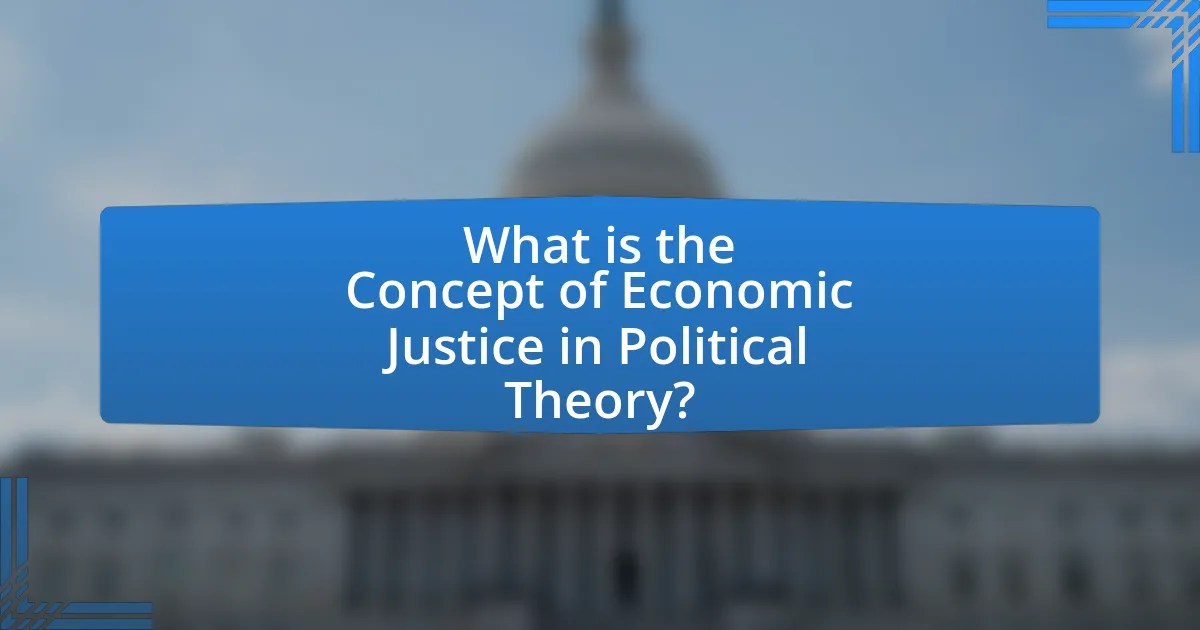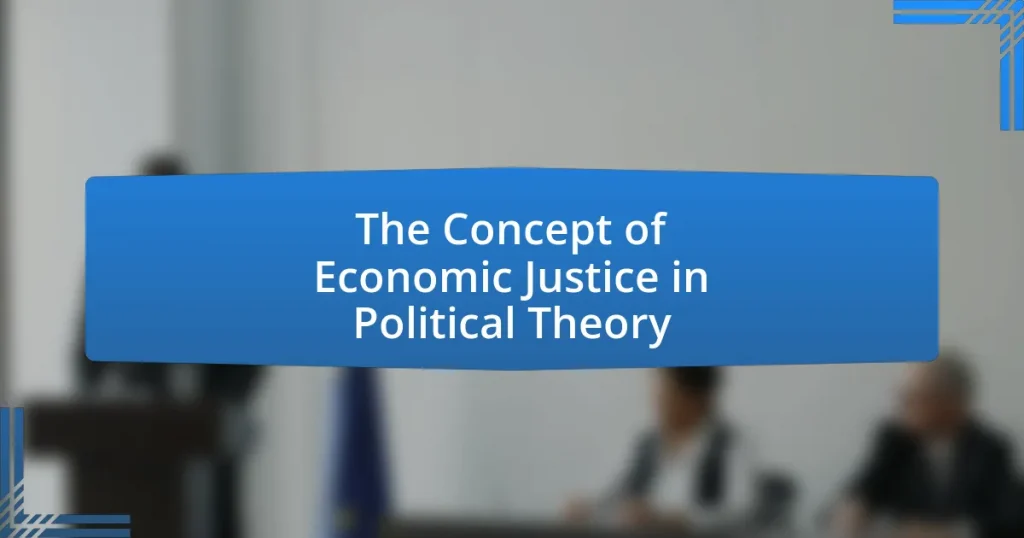The concept of economic justice in political theory pertains to the fair distribution of resources, opportunities, and privileges within society, ensuring equitable access for all individuals. This principle is rooted in theories of distributive justice, emphasizing fairness and the need to benefit the least advantaged members of society. The article explores the historical origins of economic justice, interpretations by various political theorists, its significance in contemporary society, and the role of policies in promoting economic equity. Additionally, it addresses challenges to achieving economic justice, the impact of globalization, and practical steps individuals and organizations can take to advocate for a more just economic system.

What is the Concept of Economic Justice in Political Theory?
The concept of economic justice in political theory refers to the fair distribution of resources, opportunities, and privileges within a society. This principle emphasizes that all individuals should have equitable access to economic resources, enabling them to achieve a decent standard of living and participate fully in societal activities. Economic justice is often grounded in theories of distributive justice, which argue that wealth and resources should be allocated based on criteria such as need, contribution, or equality. Historical contexts, such as the works of philosophers like John Rawls, highlight the importance of fairness in economic arrangements, asserting that social and economic inequalities should benefit the least advantaged members of society.
How is Economic Justice defined within Political Theory?
Economic justice within political theory is defined as the equitable distribution of resources and opportunities, ensuring that all individuals have access to the means necessary for a dignified life. This concept emphasizes fairness in economic policies and practices, advocating for the reduction of inequalities that arise from systemic structures. Political theorists like John Rawls argue for principles of justice that prioritize the least advantaged members of society, suggesting that a just economic system must address disparities in wealth and power. Additionally, Amartya Sen’s capability approach highlights the importance of enabling individuals to achieve their potential, further reinforcing the notion that economic justice is not merely about wealth distribution but also about empowering individuals through access to essential resources and opportunities.
What are the historical origins of Economic Justice in Political Thought?
The historical origins of Economic Justice in Political Thought can be traced back to ancient philosophical traditions, particularly in the works of Plato and Aristotle. Plato, in “The Republic,” emphasized the idea of a just society where resources are distributed according to the needs of individuals, advocating for a form of communal ownership. Aristotle further developed these ideas by discussing the concept of distributive justice, which focuses on the fair allocation of resources based on merit and contribution to society.
In the medieval period, thinkers like Thomas Aquinas integrated Christian ethics with economic thought, arguing that economic activities should serve the common good and promote social welfare. The Enlightenment brought about a shift with philosophers such as John Locke, who introduced the notion of property rights as a natural extension of individual liberty, while also recognizing the need for social contracts that ensure equitable treatment.
The 19th century saw the rise of socialist thought, with figures like Karl Marx critiquing capitalism and advocating for economic justice through the redistribution of wealth and the abolition of class structures. This historical trajectory illustrates how the concept of Economic Justice has evolved, influenced by various philosophical, ethical, and socio-economic contexts throughout history.
How do different political theorists interpret Economic Justice?
Different political theorists interpret Economic Justice through various lenses, emphasizing distinct principles and outcomes. For instance, John Rawls advocates for a distributive justice model that prioritizes the least advantaged, proposing the “difference principle” which asserts that inequalities are acceptable only if they benefit the worst-off members of society. In contrast, Robert Nozick argues from a libertarian perspective, asserting that economic justice is rooted in individual rights and entitlements, emphasizing voluntary exchanges and minimal state intervention. Meanwhile, Marxist theorists critique capitalist structures, arguing that economic justice requires the abolition of class distinctions and the establishment of a classless society where resources are distributed according to need. Each interpretation reflects differing foundational beliefs about fairness, rights, and the role of the state in economic distribution.
Why is Economic Justice important in contemporary society?
Economic justice is important in contemporary society because it addresses systemic inequalities and promotes equitable distribution of resources. This concept ensures that all individuals have access to basic needs, opportunities, and fair treatment, which is essential for social stability and cohesion. Research indicates that societies with higher levels of economic justice experience lower rates of poverty and crime, as well as improved overall well-being. For instance, the World Inequality Report 2022 highlights that reducing income inequality can lead to sustainable economic growth and social progress. Thus, economic justice is crucial for fostering a fair and just society where everyone can thrive.
What role does Economic Justice play in addressing inequality?
Economic Justice plays a crucial role in addressing inequality by advocating for fair distribution of resources and opportunities within society. This concept emphasizes the need for equitable access to economic benefits, which can reduce disparities in wealth and income. For instance, policies promoting minimum wage increases and progressive taxation are designed to redistribute wealth more fairly, thereby alleviating poverty and enhancing social mobility. Research indicates that countries with stronger economic justice frameworks, such as Nordic nations, experience lower levels of income inequality and higher overall well-being, demonstrating the effectiveness of these principles in practice.
How does Economic Justice influence policy-making?
Economic justice significantly influences policy-making by prioritizing equitable distribution of resources and opportunities. Policymakers often incorporate principles of economic justice to address systemic inequalities, ensuring that marginalized communities receive fair access to economic benefits. For instance, policies such as progressive taxation and social welfare programs are designed to redistribute wealth and reduce poverty, reflecting the ideals of economic justice. Research by the International Labour Organization indicates that countries with strong economic justice frameworks tend to have lower income inequality and better social outcomes, demonstrating the effectiveness of these policies in promoting fairness and stability.

What are the key principles of Economic Justice?
The key principles of Economic Justice include equity, access, participation, and rights. Equity ensures fair distribution of resources and opportunities, addressing disparities in wealth and income. Access emphasizes the importance of providing individuals with the means to participate in economic activities, such as education and employment. Participation involves engaging individuals in decision-making processes that affect their economic conditions, fostering a sense of ownership and responsibility. Rights highlight the entitlements individuals have to basic economic resources and protections, ensuring that all members of society can achieve a minimum standard of living. These principles are foundational in promoting a fair and just economic system that benefits all members of society.
How do fairness and equity relate to Economic Justice?
Fairness and equity are fundamental components of economic justice, as they ensure that resources and opportunities are distributed in a manner that is just and impartial. Economic justice seeks to rectify imbalances in wealth and power, advocating for systems that promote equal access to economic resources. For instance, the principles of fairness demand that individuals have equal opportunities to succeed, while equity emphasizes the need for tailored support to address historical disadvantages faced by marginalized groups. Research by the International Labour Organization highlights that equitable labor practices can lead to improved economic outcomes for disadvantaged populations, reinforcing the connection between these concepts and economic justice.
What are the distinctions between equality and equity in this context?
Equality refers to providing the same resources or opportunities to all individuals, while equity involves distributing resources based on the specific needs and circumstances of individuals to achieve fair outcomes. In the context of economic justice in political theory, equality emphasizes uniformity in treatment, whereas equity recognizes that different individuals may require different levels of support to achieve similar results. For instance, policies aimed at equality might allocate the same amount of financial aid to every citizen, while equity-focused policies would assess individual circumstances and provide varying amounts of aid to ensure that all citizens can achieve a comparable standard of living. This distinction is crucial in discussions of economic justice, as it highlights the importance of addressing systemic inequalities rather than merely treating everyone the same.
How do social justice and economic justice intersect?
Social justice and economic justice intersect by addressing the systemic inequalities that affect marginalized communities, where economic disparities often stem from social injustices. For instance, access to quality education and healthcare, which are fundamental components of social justice, directly influences economic opportunities and outcomes. Research indicates that communities facing social injustices, such as racial discrimination, experience higher poverty rates and limited access to resources, which perpetuates economic inequality. The 2019 report by the Economic Policy Institute highlights that racial wage gaps persist due to historical and ongoing discrimination, illustrating the interconnectedness of social and economic justice.
What are the various theories of Economic Justice?
The various theories of Economic Justice include Utilitarianism, Rawlsian Justice, Libertarianism, and Marxist Justice. Utilitarianism focuses on maximizing overall happiness and welfare, suggesting that economic resources should be distributed to achieve the greatest good for the greatest number. Rawlsian Justice, proposed by John Rawls, emphasizes fairness and equality, advocating for a system where social and economic inequalities are arranged to benefit the least advantaged members of society. Libertarianism prioritizes individual rights and property ownership, arguing that economic justice is achieved through voluntary exchanges and minimal state intervention. Marxist Justice critiques capitalism, asserting that economic justice requires the abolition of private property and the establishment of a classless society where resources are shared equitably. Each theory presents a distinct perspective on how economic resources should be allocated and the principles that should guide such distributions.
What is the difference between distributive and retributive justice?
Distributive justice focuses on the fair allocation of resources and benefits among individuals in society, while retributive justice emphasizes the appropriate response to wrongdoing, typically through punishment. Distributive justice seeks to ensure that individuals receive their fair share based on criteria such as need, merit, or contribution, as articulated by philosophers like John Rawls in “A Theory of Justice.” In contrast, retributive justice is concerned with establishing a moral balance by imposing penalties on those who violate laws or social norms, as discussed in legal theories that prioritize accountability and deterrence.
How do utilitarian and libertarian perspectives approach Economic Justice?
Utilitarian and libertarian perspectives approach economic justice fundamentally differently. Utilitarianism emphasizes maximizing overall happiness and welfare, advocating for redistributive policies to reduce inequality and improve the well-being of the least advantaged. This perspective is supported by the principle that actions are justified if they lead to the greatest good for the greatest number, as articulated by philosophers like Jeremy Bentham and John Stuart Mill.
In contrast, libertarianism prioritizes individual rights and property ownership, arguing that economic justice is achieved through voluntary exchanges and minimal government intervention. Libertarians, such as Robert Nozick, contend that redistribution infringes on personal freedoms and that justice is rooted in respecting individuals’ rights to their own resources, regardless of the resulting inequalities. Thus, while utilitarianism seeks to balance welfare through collective measures, libertarianism focuses on protecting individual liberties and property rights as the foundation of economic justice.

How does Economic Justice manifest in practice?
Economic justice manifests in practice through policies and initiatives aimed at reducing inequality and ensuring equitable access to resources. For example, progressive taxation systems redistribute wealth by imposing higher tax rates on the wealthy, which can fund social programs that benefit lower-income individuals. Additionally, labor laws that establish minimum wage standards and protect workers’ rights contribute to fair compensation and job security, promoting economic equity. Studies show that countries with strong social safety nets, such as those in Scandinavia, experience lower levels of poverty and greater overall economic stability, demonstrating the effectiveness of these practices in achieving economic justice.
What policies promote Economic Justice in different political systems?
Policies that promote Economic Justice in different political systems include progressive taxation, universal basic income, and social welfare programs. Progressive taxation ensures that higher income earners contribute a larger percentage of their income, which can reduce income inequality and fund public services. Universal basic income provides a guaranteed income to all citizens, helping to alleviate poverty and provide financial security. Social welfare programs, such as healthcare and education, aim to provide essential services to all individuals, regardless of their economic status, thereby promoting equal opportunities. These policies have been implemented in various forms across political systems, demonstrating their effectiveness in advancing economic justice. For instance, Scandinavian countries utilize high taxation and extensive welfare systems to achieve low levels of income inequality and high standards of living.
How do taxation and welfare systems reflect Economic Justice principles?
Taxation and welfare systems reflect Economic Justice principles by redistributing wealth to reduce inequality and provide essential services to all citizens. These systems are designed to ensure that individuals contribute to the common good based on their ability to pay, which aligns with the principle of fairness in economic contributions. For instance, progressive taxation, where higher income earners pay a larger percentage of their income, aims to alleviate poverty and fund social programs that support disadvantaged groups. According to the Organisation for Economic Co-operation and Development (OECD), countries with more progressive tax systems tend to have lower income inequality, demonstrating the effectiveness of such policies in promoting economic justice. Additionally, welfare programs like unemployment benefits and healthcare access are crucial for providing a safety net, ensuring that all individuals have the opportunity to thrive, regardless of their economic circumstances.
What role do labor rights play in achieving Economic Justice?
Labor rights are essential for achieving economic justice as they ensure fair wages, safe working conditions, and the right to organize, which collectively empower workers and promote equitable economic participation. By establishing legal protections and standards, labor rights help to reduce income inequality and prevent exploitation, thereby fostering a more just economic system. For instance, countries with strong labor rights frameworks, such as those in Scandinavia, often exhibit lower levels of poverty and higher standards of living, demonstrating the direct correlation between robust labor rights and economic justice outcomes.
What challenges exist in achieving Economic Justice?
Achieving economic justice faces several challenges, including systemic inequality, lack of access to resources, and political resistance. Systemic inequality manifests through entrenched disparities in wealth and income, where marginalized communities often experience limited opportunities for economic advancement. For instance, data from the U.S. Census Bureau indicates that the wealth gap between white households and Black households is significant, with white households holding nearly eight times the wealth of Black households. Additionally, lack of access to education and quality jobs further exacerbates these disparities, as individuals from disadvantaged backgrounds struggle to secure stable employment. Political resistance arises from vested interests that benefit from the status quo, making it difficult to implement policies aimed at redistributing wealth or enhancing social safety nets. These challenges collectively hinder progress toward achieving economic justice.
How do systemic barriers hinder Economic Justice?
Systemic barriers hinder Economic Justice by perpetuating inequality and limiting access to resources and opportunities for marginalized groups. These barriers, such as discriminatory laws, unequal education systems, and biased hiring practices, create an environment where certain populations cannot achieve economic stability or mobility. For instance, research from the Economic Policy Institute shows that racial wage gaps persist due to systemic discrimination, with Black workers earning 73% of what their white counterparts earn, highlighting how these barriers directly impact economic outcomes.
What are the implications of globalization on Economic Justice?
Globalization significantly impacts economic justice by exacerbating income inequality and altering labor standards. As countries integrate into the global economy, wealth often concentrates among multinational corporations and affluent nations, leaving marginalized communities and developing countries at a disadvantage. For instance, the World Bank reported that the richest 10% of the global population owns 76% of the world’s wealth, highlighting the disparity created by globalization. Additionally, globalization can lead to a race to the bottom in labor standards, where countries lower wages and reduce protections to attract foreign investment, undermining workers’ rights and economic equity. This dynamic illustrates how globalization can challenge the principles of economic justice by prioritizing profit over equitable distribution of resources.
What are practical steps to promote Economic Justice?
To promote Economic Justice, implement policies that ensure equitable access to resources, fair wages, and social safety nets. Governments can establish living wage laws to guarantee that all workers earn enough to meet basic needs, which has been shown to reduce poverty rates significantly. Additionally, enacting progressive taxation can redistribute wealth more fairly, as evidenced by studies indicating that countries with higher tax rates on the wealthy experience lower income inequality. Expanding access to quality education and healthcare also plays a crucial role, as these services empower individuals to improve their economic standing, supported by research from the World Bank highlighting the correlation between education access and economic mobility. Finally, fostering inclusive economic growth through support for small businesses and marginalized communities can create more equitable opportunities, as demonstrated by initiatives in various countries that have successfully uplifted disadvantaged populations.
How can individuals contribute to the pursuit of Economic Justice?
Individuals can contribute to the pursuit of Economic Justice by advocating for policies that promote equitable distribution of resources and opportunities. Engaging in community organizing, supporting fair labor practices, and participating in local governance can amplify voices for change. For instance, research from the Economic Policy Institute shows that raising the minimum wage can significantly reduce poverty levels, demonstrating the impact of policy advocacy on economic equity. Additionally, individuals can support businesses that prioritize social responsibility, thereby fostering a more just economic environment.
What role do community organizations play in advocating for Economic Justice?
Community organizations play a crucial role in advocating for economic justice by mobilizing grassroots efforts, raising awareness, and influencing policy changes. These organizations often serve as a voice for marginalized communities, highlighting issues such as income inequality, access to resources, and systemic barriers. For instance, organizations like the National Community Reinvestment Coalition have successfully lobbied for policies that promote equitable access to financial services, demonstrating their impact on economic justice advocacy. Additionally, community organizations provide education and resources to empower individuals, fostering collective action that can lead to significant social and economic reforms.


